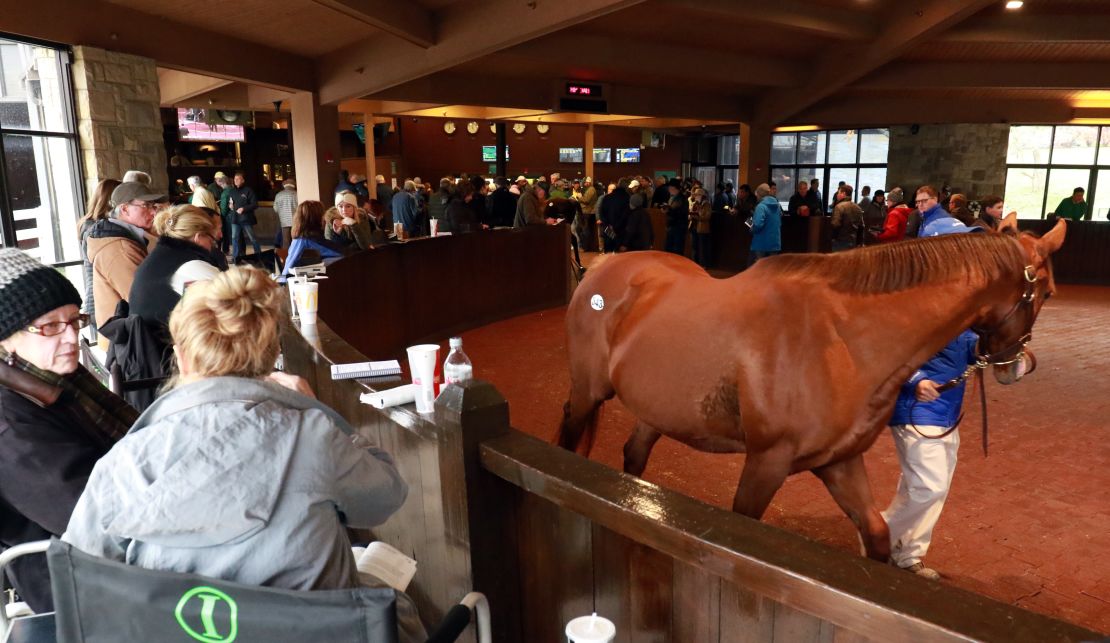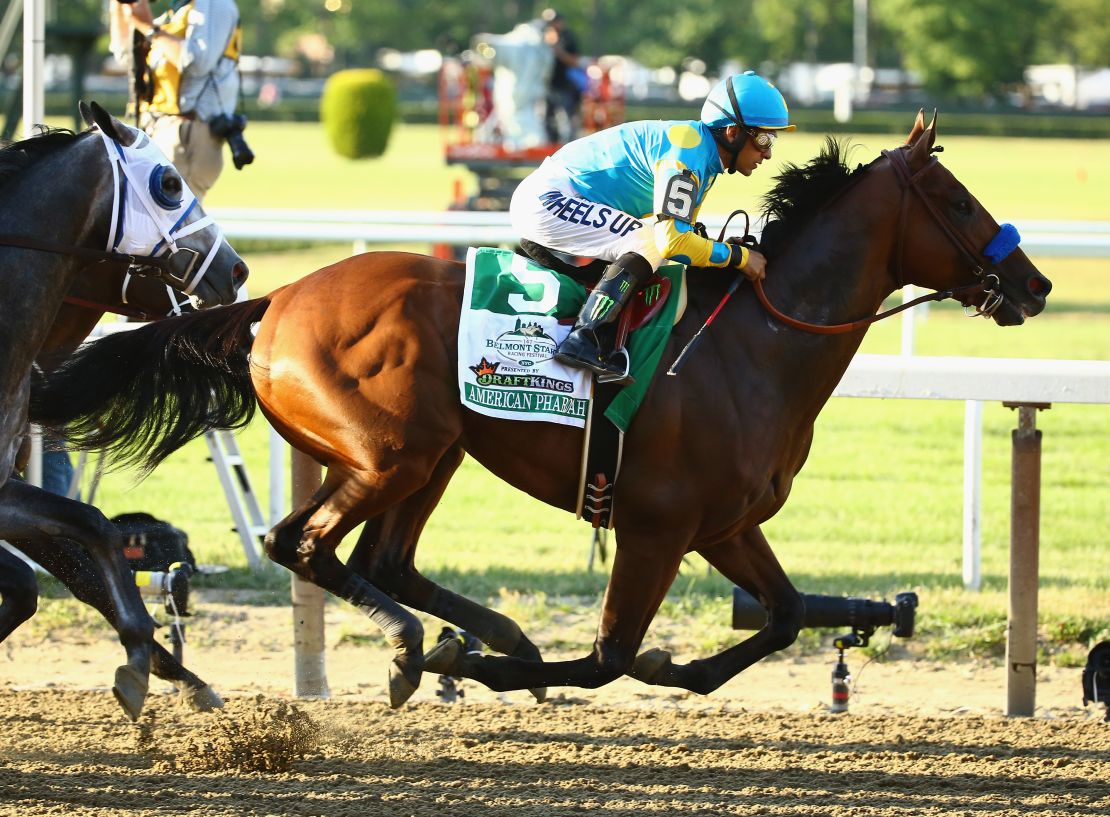Story highlights
Triple Crown winner Justify sold at Keeneland in 2016 for $500,000
Horses have a "speed gene" which predicts whether they are better suited to short, middle or long distance racing
It’s known as the “Superbowl” of horse sales, but instead of helmeted hardmen it is royals and millionaires who lock horns at Keeneland to snap up the next Triple Crown winner.
The Keeneland Yearling Sale in Lexington, Kentucky is the world’s largest thoroughbred auction for young horses, and it attracts the cream of the racing world looking to add to their equine armory.
Its reputation continues to grow after Justify, which sold for $500,000 in 2016, clinched the 2018 Triple Crown – an impressive buy, given the colt’s value skyrocketed to more than $60 million after his win at Belmont Park earlier this year.
Keeneland still holds the record for the most expensive yearling ever sold at auction – in 1985 Seattle Dancer, sired by the 1971 British Triple Crown winner Nijinsky, went for $13.1 million.
“This is the Superbowl or the Premier League in horse racing in terms of auctions,” Bob Elliston, Keeneland’s vice president of racing and sales, tells CNN Sport.
He says with graduates like Justify, people “like to go back where they know proven results occur.”
READ: The white-faced horse who’s the talk of the racecourse
During September’s 13-day sales, Keeneland’s Yearling auction will showcase more than 4,500 horses.
“There are hundreds of people on our grounds going barn to barn and inspecting these horses,” Elliston says.
“They’re looking at how they walk, they look at their coat and how shiny it is, they look at their muscular confirmation.
“There really is something for everyone here with so many well-bred athletically built horses.”
Pressure is on for horses to behave
Elliston expects to see more than $300 million turned over during the sales.
“Buyers are selective and they’re looking for perfection,” he says. “If you have that horse that is perfection, they’re willing to pay significant amounts of money, but if there’s something off – if the walk isn’t just right, or there’s a physical confirmation issue or a gap in the pedigree, it’s tough to bring the top dollars.”

READ: Stradivarius scoops $1.2M bonus in virtuoso season
This year, a yearling colt out of 2015 Triple Crown winner American Pharoah has already sold for $2.2 million to Godolphin, one of racing’s most powerful operations which is owned by Dubai ruler Sheikh Mohammed bin Rashid al Maktoum, who reportedly made an appearance at the sale Monday. On Tuesday, a colt by War Front sold to Goldophin’s European rival Coolmore for $2.4M – the most expensive thoroughbred yearling to sell anywhere in the world so far in 2018, according to Keeneland.
READ: Undefeated Triple Crown winner Justify retires from racing
When it comes to purchasing a horse, Elliston reveals that some buyers wait until the very last moment – the horse’s final test is whether it can stay calm amidst the bidding excitement.
“It’s indicative of how a horse may behave on a big race day,” he says.
“So often in racing you have these wonderful athletes who are very fast or can run long distances at a high-rated speed but they fall apart mentally in the anxiety of a big race day.
“When you walk into the sale pavilion you have this crowd, this enthusiastic excited crowd with the auction going on and the loud noises … if that horse doesn’t turn a hair, if that horse behaves him or herself perfectly and is as calm as he can be that’s a great sign because that’s likely to be how the horse behaves on a big race day.”
If buyers don’t have any luck at this auction, Europe’s leading bloodstock auction house Tattersalls holds its yearling sale early October in Newmarket, England.
READ: Legendary champion Frankel scoring at stud
Predictions the ‘speed gene’ can make
But other than studying a horse’s pedigree and looking at its physical and mental condition on the day, how can you truly know whether it’s destined to be a superstar? Groundbreaking research 10 years ago by Emmeline Hill, associate professor of equine science at University College Dublin, revealed thoroughbreds have a single gene which has a major influence on speed.
By reading the DNA code of the “speed gene” (scientifically known as the Myostatin gene), predictions can be made about how a horse is likely to perform on a racecourse.
READ: Australia’s first female jockey who lived life as a man
She says while testing is highly accurate, the results aren’t a judgment on whether a horse is good or bad, but about what type of race it’ll do best in. The test can predict if the horse is better suited to sprint, middle-distance or endurance racing due to its muscle development and muscle fiber type.

“It’s about using the information to maximize the potential of that individual horse and place it in races where it’s best suited and where it has the opportunity to perform to its best ability,” she told CNN Sport.
READ: Meet Big Jake and Thumbelina – the tallest and smallest horses in the world
The other thing the test can predict, Hill says, is whether they’re best suited to racing on dirt or turf.
“This is useful targeting the most suitable races for horses but also useful for owners to select trainers that might have a preference to dirt or turf training,” she says.
“It’s important to recognize that it’s not black and white – genetics contributes to a portion of the differences between individual horses … management, the training, the diet, early life experiences will all impact how the genetics manifest.”

READ: Horses can make facial expressions just like humans
Hill is also chief strategy officer of Plusvital, which can provide trainers, owners and breeders with genetic tests for their horses.
To date, the company has tested more than 20,000 horses and have clients in over 30 countries.
She says sellers will test their horses in advance of sales to help them benchmark and compare horses among their draft, while buyers tend to test immediately after purchase to help them decide on what route the horse is best suited for.
‘Go beyond the pedigree’
While there has been large support for the new technological advancements, she says there has been some reluctance from the traditional industry.
“It may be a lack of understanding of the real benefits that genomes can bring to the entire population,” she says. “I think this will have to be led by education efforts by the industry bodies.
“There are challenges that come with bringing new technology into an industry that’s generally quite traditional. It’s been around for 300 years and people have been breeding horses in quite similar ways for 300 years.”
A history of the thoroughbred
READ: Saxon Warrior set for ‘£50M payday’ for Epsom Classic win
She adds: “What our genetics can do is go beyond the pedigree and really look inside the horse and what that individual has inherited from the parents.
“What we’re trying to do is introduce scientific basis into decision making to help people better inform those decisions using science rather than opinion and anecdote.”
Economic climate is good for buying horses
Elliston says the climate for buying horses is good – thanks to a buoyant US economy and the success of horses from their previous sales.
“Keeneland really is the benchmark or the sale that sets the bar for the economic climate and the horse industry and that’s, I think, because of the caliber of the horses that are part of the sales.
“We always say nobody has to have a horse but they want a horse, and it helps when financially you’re feeling good about yourself and your condition to go and make that purchase.”
The excitement around Justify winning the Triple Crown earlier this year has also piqued the interest of some people who wouldn’t normally look to buy a horse.
“I think what Justify has done is it’s gotten to another circle of folk who don’t spend each and every day thinking of buying a horse. It has created some enthusiasm,” adds Elliston.
Visit CNN.com/horseracing for more news, features and videos.
“When you have disposable income, when you feel about your financial condition you might extend your reach and risk a little bit to balance your portfolio into the horse business and I think that’s what Justify has done. It’s created another element of reach into folks as a possible investment.”

















